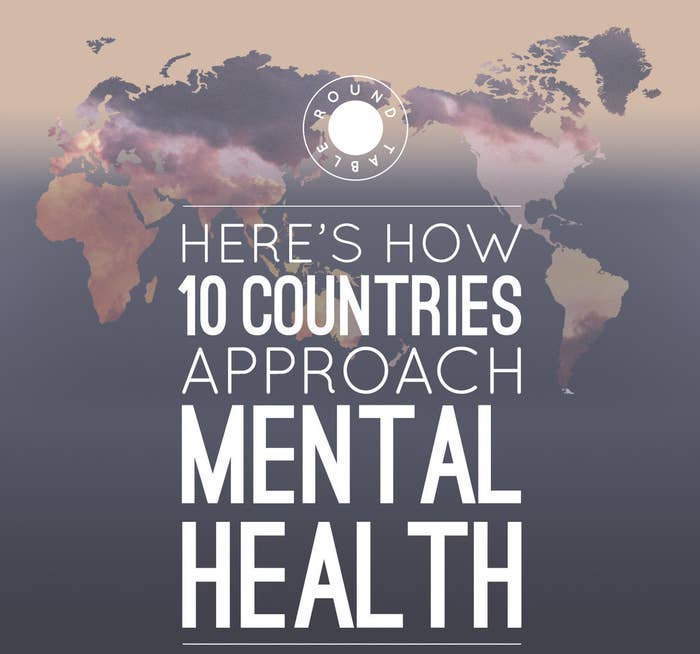
The ways people perceive, talk about, and treat mental illness vary around the world. We asked BuzzFeed staffers from ten different countries to talk about the way mental health is approached where they live.
Attitudes around mental health and access to treatment also vary widely within each country by gender, age, cultural experience, geography, income, profession, and so many other factors. This conversation is a starting point based on our own experiences and reporting.
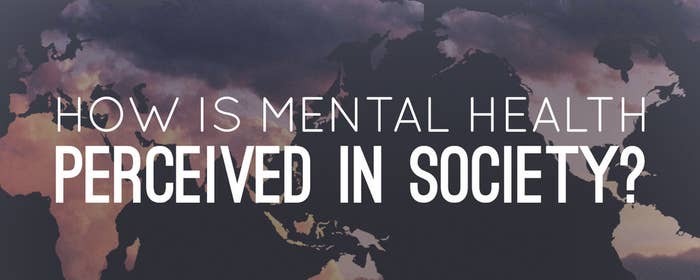

Jenna Guillaume: I think it's still very much a taboo topic. While people are becoming more open about it — especially younger people — and campaigns like Mental Health Week (in October in Australia) and organisations like Headspace and the Black Dog Institute are helping to destigmatize mental health issues, I would say many people still find it hard to talk about.
Personally, I have spoken to close friends and family about my anxiety, and have asked a close friend for a therapist recommendation as she was dealing with similar issues. But for a long time I was ashamed to talk about it, and I do think that is partially because of the stigma that still exists in Australia.

Iran Giusti and Flora Paul: It's hard to be open about it. If you're on medications or go to therapy, it's not something you usually talk about. And if you talk about it, it's usually in a very casual way, like, "Oh, I have such anxiety."
You don't usually ask friends or family for recommendations, and even health professionals don't usually recommend mental health treatments, unless you ask.

Kat Angus: While there is a fair amount of social stigma surrounding mental health issues in Canada, it definitely feels as though people are slowly realizing that mental health concerns everyone and that mental illness is nothing to be ashamed of. Don't get me wrong — it's still rare for people to speak publicly about their struggles, but I personally have discussed my past with depression and my suicide attempt with family and friends, only to find out that many of them also struggled with mental illness. It's easier to understand that we're not alone.
Elamin Abdelmahmoud: There have been a lot of campaigns to work on fighting stigma around mental health in Canada recently, and that's positive. But we need those campaigns because stigma is strong here and there isn't an ease with which we talk about mental health.

Marie Telling: It's not openly discussed that much, although people tend to be more open about it in big cities, especially Paris, where it's more common to admit seeing a therapist and to ask for recommendations from friends.
Mental illness is still stigmatized a lot and associated with notions of danger, social exclusion, irresponsibility, and unreliability. According to a study from 2009, almost 70% of French people believe mental illnesses "aren't like other illnesses."
So there is still a lot of stigma, shame, and secrecy surrounding the recognition and treatment of mental illness, which often prevents people from getting treated right away, or at all. There is also the idea that you should "be strong" and "get over yourself" when you're depressed or anxious rather than "medicalize" it.

Dani Beck: It really depends on your environment. Some people are very open and understanding; others don't know how to handle it. If you feel comfortable with a friend, it's fine to ask for a recommendation. If you work for a company that looks after their employees' (mental) health, you might even be able to ask there. But generally it seems safer to keep it a secret. Friends and family often believe clichés the media spreads, such as people who are depressed just need to "cheer up."

Andre Borges: I do believe that there are some people in India who are open to having discussions on depression, PTSD, substance abuse, and social anxiety, but for the majority of people these disorders are still quite stigmatized. I think people feel the need to hide their social anxieties, not so much from their parents, but from their peers and friends. When it comes to therapy, people don't talk about it while they're in it, but maybe once they're done with it, they'll tell a close friend or a relative.
The biggest stigma out here is probably the fact that if you admit you are diagnosed with a mental illness, people think you're crazy. People don't equate mental health with being a medical issue. So it seems like something outside the vein of normal. Hence to get treated for these ills makes you a pariah at times.

Baxter Aceves: Going to therapy or accepting that you need guidance/counseling has become more and more ~acceptable~. However, there are still a lot of cases (with more complicated issues, like autism) where families choose to "hide" the patients from society. So, in a nutshell, people are opening a little bit more to this, but there is a long way to go on this subject.

Beatriz Serrano: People feel kind of ashamed to say openly that they go to therapy, and you usually only talk about big mental health topics with close friends and family members.
The way people perceive mental illness has changed a lot over the past few years, but while people believe it's ok to go to therapy if "something happened to you" (if someone close to you died or you got a divorce, for instance), things are different when you have a mental illness "out of nowhere." There is a lack of information about it in general.

Ellie Bate: I think, while we're getting better at talking about it and campaigns such as Time to Change have been launched to put an end to the stigma associated with mental health, it's definitely considered un-British to openly discuss your mental health.
Before I moved to London, nobody I knew had ever attended therapy, and talking about mental health issues was pretty much taboo. It's more of a behind-closed-doors kind of thing, and that's if it's talked about at all. There's definitely an attitude in Britain of keeping your problems to yourself and maintaining that traditional British stiff upper lip, and I definitely think that extends to discussions of mental health.

Susie Armitage: I can only speak from my own experience as a white woman who was born here. These stories about mental health by writers of color explore a much broader range of experiences, including how the immigration system and racism can have an impact on mental health.
I sought help when I was in my early twenties for anxiety and depression. One friend who knew asked me for the name of my doctor. But mostly it felt like something I had to hide. I was living in Washington, D.C., where a lot of jobs require security clearances and extensive background checks. I never actually went through that process, but it felt like everyone had a "permanent record" somewhere. I worried about employers finding out.
I do think there's a pro-self-help mentality in American culture, and that extends to mental health. More and more, seeking help is becoming seen as a positive thing. But there's still stigma.
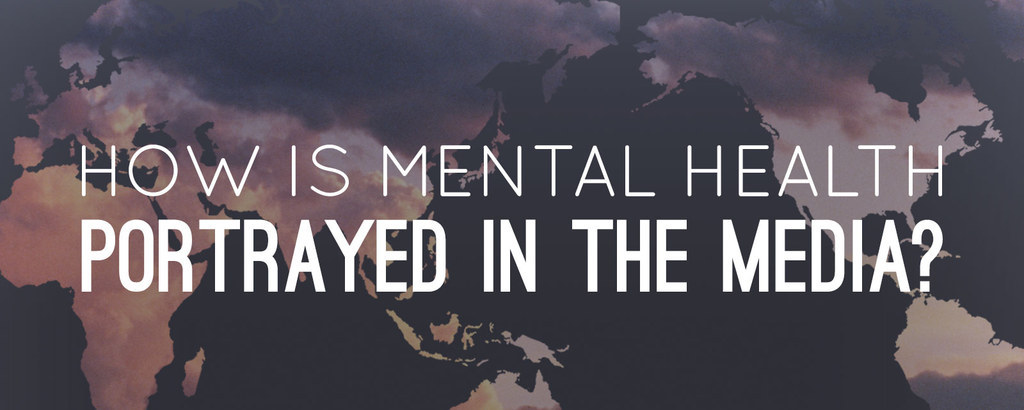

JG: I think on the whole the mainstream media in Australia has made a concerted effort in the past few years to report on mental health issues in an open and frank way. During Mental Health Week in October, the ABC dedicates a whole week of programming to the subject, called "Mental As," and there are shows like Josh Thomas's Please Like Me that tackle mental health in a sensitive and authentic way.
There've been a few high-profile people speaking openly about their mental health — actors like Ruby Rose, TV presenters like Jessica Rowe, and sports stars like Matthew Mitcham and Buddy Franklin. The response of the public has been quite reassuring and supportive on the whole.
But this is mostly after an awful incident in 2014 where model and TV personality Charlotte Dawson ended her own life after she was open about her depression and faced extensive online bullying. It did lead to increased awareness and more open conversations.

IG and FP: The media only covers mental health on rare occasions, and there's usually something glamorous about it.
Famous actor Ana Paula Arósio quit a telenovela on primetime and news reports said she was suffering from depression, but she never talked about it.
A model named Cibele Dorsa killed herself after her boyfriend's suicide. Caras, a Brazilian magazine (similar to Hello), had her on the cover with the headline "She died for love."

KA: The most high-profile mental health initiative in Canada is Bell Let's Talk Day. Every year since 2010, the Let's Talk initiative has used one day each January to encourage people to speak openly and honestly about their experiences and struggles with mental health. It has been a hugely successful initiative that has helped raise money, awareness, and compassion for mental health across the country.
But while Bell Let's Talk Day has been a big success in Canada (the initiative recently extended its commitment through to 2020 with $100 million), it can sometimes feel as though discussion of mental health during the rest of the year is often swept under the rug. It's certainly better to have one day of discussing mental health rather than zero days, but when so much focus is put on one specific day, it can seem as though that is the only time to discuss the issue.

MT: According to Viviane Kovess-Masfety, an expert in epidemiology in mental health, the French media "never talks about mental health in a positive way, but always in a dramatic way. It has very negative and dangerous consequences on the patients and their families."
French media has participated in the stigmatization of mental illnesses, and French news usually covers the issue only after something tragic happens.
Several French celebrities have talked about living with depression and going to therapy. But in the press, depression is always reported as being the consequence of a tragic event — this one celebrity was depressed after breaking up with her boyfriend, this other one after his movie flopped, etc.

DB: Some sports stars have been very open about mental health. Sebastian Deisler, for instance, quit his successful career because of depression. Bruce Darnell who used to be on Germany's Next Topmodel and is a judge on Germany's Got Talent (Das Supertalent), also spoke about his mental health.
Generally the media assumes, but no one really admits. Eating or drinking disorders are pretty much the only thing people admit to having. Nothing like autism, depression or OCD is ever publicly discussed. The public believes clichés such as OCD is like Monk, and depression is something every VIP has about four times a year when a photo of them looking sad is taken.

AB: It hasn't been touched upon much in Bollywood. There are a couple of films, like Barfi, Hasee Toh Phasee, and Taare Zameen Par, that have touched upon autism, ADHD, and dyslexia. But those are the outliers. Most films don't talk about mental health much.
The industry is pretty vocal about problems like depression, and other illnesses, though. Over the past few years, several celebrities have spoken out about depression, anxiety, and other struggles. Shah Rukh Khan, Anushka Sharma, and most notably Deepika Padukone have been extremely vocal. Deepika has even started a foundation to help people deal with depression.

BA: When celebrities have a breakdown, they mostly become religious. But there haven't been many examples of celebrities actually accepting mental illness. A TV host named Mauricio Clark said he was suffering from addiction and "emotional illness" on TV, and said the reason for his addiction was that he didn't accept his homosexuality and was struggling with society's prejudices.

BS: I asked the rest of the newsroom and it's weird how we can remember celebrities speaking about fighting against cancer but not fighting against depression, for example. From time to time, lists about "celebrities with mental illness" are published, but they are all from the U.S. or the UK.
There is a lack of information about it, but it's changing. Since depression is one of the most common illness, the media is starting to talk about it, though it's still not a "popular" topic.

EB: There are often storylines in our big soap operas that deal with mental health issues, and at the end of the episode they will advertise hotlines and websites for people suffering with similar problems, which I think is great.
There have been a few big celebrities open up about their issues with mental health, like J.K. Rowling, and recently Tom Fletcher from McFly talked about his depression. Now that the internet is such a huge platform, as well, it's definitely become easier for people to share their experiences with mental illness. One of the most prevalent ambassadors for mental health care in the UK, for example, is YouTuber Zoella.
Again, I think British media has improved a lot in terms of speaking out about mental health, but we still have a long way to go before it's completely accepted.

SA: A good number of celebs are speaking about their own experiences with mental illness and getting mostly positive feedback. I think the tendency of American culture toward openness and personal stories helps foster that. But there's still a lot of work to do. For example, the Associated Press Stylebook, which is used by journalists across the U.S., didn't have a section on mental illness until 2013.
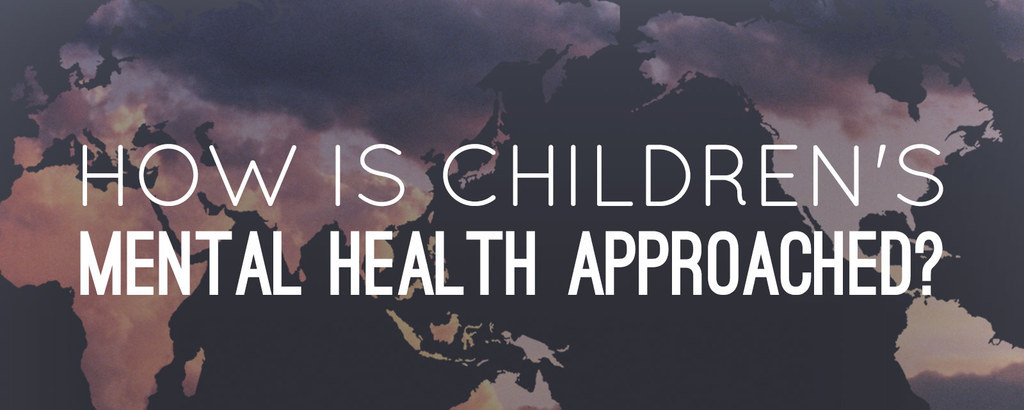

JG: A National Survey of Mental Health and Wellbeing conducted in 2014 found that almost 1 in 7 (14%) of 4- to 17-year-old Australians were assessed as having a mental health disorder in the previous 12 months. But there is more help at hand than ever before.
A family general practitioner (GP) is still one of the best service providers for young people in need. And at Kids Helpline, young people can speak to a counselor on the phone 24 hours a day, seven days a week. The service talks with more than 5,500 kids each week.
There are school counselors in high schools. However, when I was at school, there was definitely stigma around it, and people gossiped if you went to see the counselor. I think it has probably lessened somewhat since then, but with the increase of mobile phone usage and the internet, bullying and associated mental health concerns seem to have gotten worse.

IG and FP: It isn't very common for kids to go to therapy. If your parents are divorcing, maybe, but even so, you have to be from a very upper-class family to do so.
In general there are no counselors in high school. If a kid "causes trouble," the school will likely just call the parents.

EA: Here's a wild statistic: in Canada, 70% of young adults living with mental health problems say their problems started in childhood. That's a high number and one that isn't talked about a lot. Canada is in the middle of a (slow) cultural shift to talk about mental health more openly, but children's mental health is not a significant part of that conversation.
KA: As a depressed and suicidal teenager in Ontario, I was lucky enough to get the help I needed when I asked for it. My guidance counselors were open to discussing my issues with me, and helped me talk to my parents about the support I needed. From there, I was given access to social workers, psychiatrists, and therapists who were vital to my recovery. My university also offered personal and mental health counseling to its students, though it was well-known that the wait time for an appointment could be lengthy. As is frequently the case, there often aren't enough resources to handle the demand.

MT: There is a real fear of over-medicalizing the behaviors of some children. Another challenge is ideological and the source of many debates: The vast majority of child psychiatrists belong to the psychoanalytic movement and are therefore strongly opposed to cognitive behavioral therapy, a method used in many countries to treat children and teenagers dealing with mental illnesses.
A study from 2012 also underlined the lack of mental health practitioners in schools and the weaknesses of their training when they were there. School psychologists do exist in France, but they're not present in every school. I personally do not remember ever hearing about a psychologist at my school, and I honestly cannot remember ever talking about mental health in class or being taught anything about it before college.

DB: Children's mental health care is perceived the same way mental health care in general is perceived, and faces similar challenges. When I went to school (1992–2005), it was never discussed at all. There were some teachers you could go to, but not really any "experts."

AB: It's actually a lot better in schools these days. There are procedures in place to flag children who might have certain problems. A lot of schools are also organizing mentor programs in which the older students are trained to help other students with problems. Apart from that, schools are also hiring staff counselors to speak to students who are distracted, to find the cause of distraction in class and figure out what the underlying problem is.

BA: Every school has a psychologist, because it's mandatory in middle school and there are some schools that start in kindergarten up to high school. Their job does not involve full-on therapy, however, but rather is to identify children's problems and redirect them to specialists who can address them. Obviously, this happens only if the family has enough resources to pay.
The main reasons kids go to a psychologist are derived from their parents' relationship status: domestic violence, divorce, having their parents split because of economic reasons (father crossing to the U.S. in order to provide for his family, etc.).

BS: We had "counselors," and the funny thing is that they were all psychologists but we never called them that. Mental health isn't discussed at all at school. If a kid has a problem, they can go to the counselor and maybe after that to a psychologist. But it's not a topic discussed at school.
In Spain we have national insurance, and the doctor can guide a child to a therapist.

EB: According to the British Association of Counselling and Psychotherapy (BACP), between 64 and 80% of secondary schools in England have some kind of access to counselling. However, there is still a long way to go to improve children's mental health care in the UK. In a 2015 report, the Department of Health advocates, among other things, for a hard-hitting anti-stigma campaign, better access to effective mental health support, and the integration of mental health specialists directly into schools and GP practices.
When I was growing up, no one ever considered that I or any of my friends could have any problems with their mental health. I have never known a child to go to therapy. There definitely wasn't an onsite psychiatrist in mine or any of my friends' schools. I think it's always just assumed here that – unless they're showing very clear signs of some kind of mental health issue – kids are all fine.

SA: We had a peer-counseling program in my high school that trained kids to talk to other kids, including when to notify an adult if the problem was serious.
According to the Centers for Disease Control and Prevention, as many as 20% of children in the U.S. "experience a mental disorder in a given year." A review of children's access to mental health care found that a lot of kids who need mental health services don't get them, and when they do, it's not necessarily with the right specialists or for enough time.
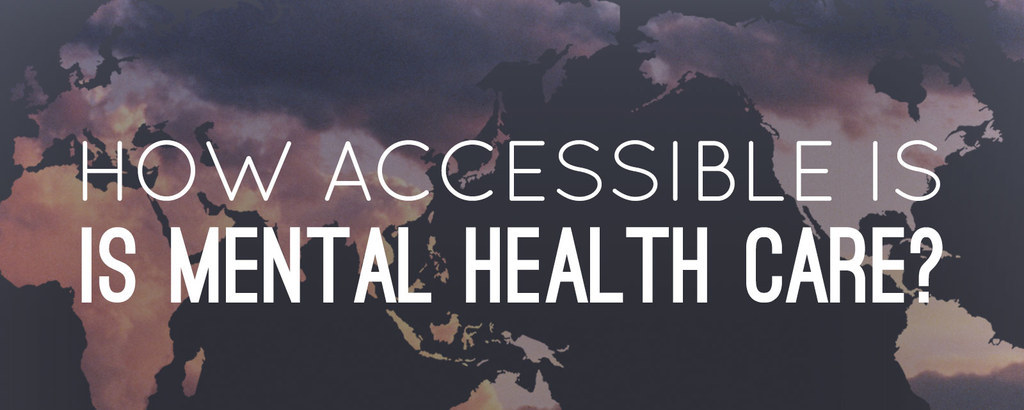

JG: Finding a therapist is really easy — if you know how! You can go to your GP directly for treatment, and if they think you require additional help, they will refer you to a specialist. This usually involves a mental health care plan, which will include up to 10 free sessions of counseling per year. The GP may refer you to someone in particular, or you can choose to find someone on your own. But most people don't realize that GPs are there to help you with mental illness as well as physical illnesses. Lack of education and awareness is the biggest barrier.
The funny thing is I think we actually have some pretty good mental health care options available — from dedicated organizations to government-subsidized therapy sessions — but because it's not talked about too often, I feel like a lot of people don't even know what options are available. On the plus side, I feel like this is improving as the stigma decreases more and more, but there is still a lot of work to do in this area.

IG and FP: When you're looking for a mental health practitioner, in general you look for recommendations on private care services or online. Private health care has a limit of around 10 therapy sessions a year and you can only get them if you have a medical recommendation for it.
When it comes to psychiatry, the public and private health care systems usually deal with it the same way: You just go there to get your prescription meds and that's it, not much talking.

KA: Although Canada does enjoy universal health care, mental health is largely not covered by our health care system, forcing most who require mental health services to pay for it out of pocket.
Some workplace health insurance plans do provide coverage for mental health services. However, the extent of these plans depends on what the employer has subscribed to. Some workplace plans will cover enough for a few appointments with a psychiatrist or therapist, but often not enough to allow for ongoing visits — and many workplace health plans don't cover mental health at all.
Access to free services also depends on location, as rural communities frequently struggle to provide services to residents. The northern Canadian territory of Nunavut currently has the highest suicide rate in the country, and its remote location makes it even more difficult to provide mental health resources to the people who live there.

MT: Paris and other major cities have way more mental health practitioners than the rest of France, making it much easier to get access to mental health in these places than in smaller cities and rural areas.
The French health care system only covers being treated by a psychiatrist, not by a psychologist, which makes access to therapy harder for many people. And even with a psychiatrist, you may have to pay part of the cost yourself if the doctor decides to charge more than what is covered.
A big part of the issue also has to do with information. The stigma surrounding mental health is still very much there and people don't often think about going to therapy or seeing a mental health practitioner to get better. Eighty-five percent of the psychotropic drugs sold in France are prescribed by general practitioners. That's because general practitioners often prescribe medication themselves to patients who are anxious or depressed rather than send them to a mental health specialist.

DB: You usually go try to find a therapist yourself, simply calling whoever you find on Google, etc. Health insurance providers can help too — for example, I called mine and they sent me some names. I also asked some friends, and what I've experienced is that once people notice you might need help, they often know someone.
Health insurance covers the cost, and you're even allowed to see a therapist/psychiatrist up to five times before you decide to do full therapy with them. So you can try many and see if you get along with them — and when you've found one, the doctor will fill out all the forms and only then request the actual therapy.

AB: Mental health isn't covered under health insurance here. People pay for their own costs.
Certain hospitals do have consultants, but most people get help through private clinics, although there aren't many. People do preliminary Google searches, but again, since there are so few private clinics, there aren't that many search hits. The most common means of finding a therapist is through word of mouth and asking close friends or people you trust.

Baxter: Coverage depends of the type of insurance you buy, but it's rare. In Mexico, people self-medicate all the time. There are indigenous medical treatments that have been around for thousands of years, and also you don't actually have to go to a doctor in order to get medicine. In recent years, the controlled medication law has gotten a bit more strict, but you can still get prescription drugs anywhere.

BS: People normally go to private therapist because it's easier. Normally you ask a friend or a member of your family for a recommendation. A one-hour session with a private therapist typically costs between 50 and 90 euros. You can also go to a doctor covered by Social Insurance, and they can refer you to a therapist. This process is normally very slow, so people often go with the first option instead.

EB: Our health care is free (yay NHS!) and offers access to free counselling, therapy, and treatment. But the waiting list to see a psychotherapist, for instance, is sometimes long and can limit access to care in some situations. In this case, people can see a private therapist if they wish, but it will cost from £40 to £100 per session.
In my experience it's also less likely for someone dealing with mental illness to seek help than it is elsewhere, because it's just not talked about. Brits are difficult when it comes to asking for help with physical illnesses, so opening up to a professional about your mental illness is even more difficult. We're a lot more likely, on the whole, to try to manage it ourselves than we are to go to therapy, but it is definitely available, and more of us should seek it out!

SA: Health insurance in the U.S. is, shall we say, ~complicated~. The implementation of the Affordable Care Act, aka Obamacare, did get more people covered who previously didn't have insurance. All plans in the government's health care "marketplace" have to cover mental health. U.S. law also requires what's called "mental health parity," which means insurance providers are supposed to cover mental illnesses the same way they cover physical illnesses (so your copay or deductible to see a mental health specialist should be comparable to the one you pay to see a physical health specialist). This law still doesn't require all providers to offer mental health coverage, just to make it comparable if they do.
Even if you have insurance, it's often still hard to access treatment in practice. Navigating the system takes a lot of energy and persistence, which generally isn't easy for someone who's living with mental illness.
We'd be happy to hear more in the comments about what the mental health situation is like where you live, especially if your country isn't listed here!
Always consult with your doctor about your personal health and wellness. BuzzFeed posts are for informational purposes only, and are no substitute for medical diagnosis, treatment, or professional medical advice.
